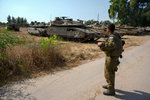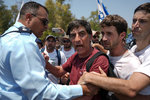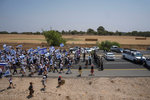



GAZA CITY, Gaza Strip (AP) — Israel conducted a wave of airstrikes in Gaza on Friday, killing at least eight people, including a senior militant, and wounding another 40, according to Palestinian officials. Israel said it was targeting the Islamic Jihad militant group in response to an “imminent threat” following the arrest of a senior militant in the occupied West Bank earlier this week.
The strikes risk igniting yet another war in the territory, which is ruled by the Islamic militant group Hamas and is home to about 2 million Palestinians. The assassination of a senior militant would likely be met by rocket fire from Gaza, pushing the region closer to all-out war.
A blast could be heard in Gaza City, where smoke poured out of the seventh floor of a tall building on Friday afternoon.
“The Israeli government will not allow terrorist organizations in the Gaza Strip to set the agenda in the area adjacent to the Gaza Strip and threaten the citizens of the State of Israel," Prime Minister Yair Lapid said in a statement. “Anyone who tries to harm Israel should know: We will find you.”
The Palestinian Health Ministry said eight people were killed, including a 5-year-old girl, and at least 40 were wounded. Islamic Jihad said Taiseer al-Jabari, its commander for northern Gaza, was among those killed. He had succeeded another militant killed in an airstrike in 2019.
A few hundred people gathered outside the morgue at Gaza City's main Shifa hospital. Some entered to identify loved ones, only to emerge in tears. One shouted: “May God take revenge against spies,” referring to Palestinian informants who cooperate with Israel.
An Israeli military spokesman said it launched the strikes in response to an “imminent threat” from two militant squads armed with anti-tank missiles that were making aggressive movements. The spokesman, who briefed reporters on condition of anonymity, said al-Jabari was deliberately targeted and had been responsible for “multiple attacks” on Israel.
The military said it was targeting Islamic Jihad in an operation named “Breaking Dawn.” It also announced a “special situation” on the home front, with schools closed and limits placed on other activities in communities within 50 miles of the border.
Israel had closed roads around Gaza earlier this week and sent reinforcements to the border as it braced for a revenge attack after the arrest of the Islamic Jihad leader in the occupied West Bank on Monday. A teenage member of the group was killed in a gun battle between the Israeli troops and Palestinian militants.
Israel and Hamas fought four wars and several smaller skirmishes in the 15 years since the militant group seized power in the coastal strip from rival Palestinian forces. The most recent war was in May 2021, and tensions again soared earlier this year following a wave of attacks inside Israel, near-daily military operations in the West Bank, and tensions at a flashpoint Jerusalem holy site.
Islamic Jihad is smaller than Hamas but largely shares its ideology. Both groups are opposed to Israel's existence and have carried out scores of deadly attacks over the years, including the firing of rockets into southern Israel. It's unclear how much control Hamas has over Islamic Jihad, and Israel holds Hamas responsible for all attacks emanating from Gaza.
Israeli Defense Minister Benny Gantz visited communities near Gaza earlier on Friday, saying authorities were preparing “actions that will remove the threat from this region,” without elaborating.
“We will operate with internal resilience and external strength in order to restore routine life in Israel’s south,” he said, “We do not seek conflict, yet we will not hesitate to defend our citizens if required.”
Earlier Friday, a couple of hundred Israelis protested near the Gaza Strip on Friday to demand the return of a captive and the remains of two Israeli soldiers held by Hamas.
The protesters were led by the family of Hadar Goldin, who along with Oron Shaul was killed in the 2014 Gaza war. Hamas is still holding their remains, as well as two Israeli civilians who strayed into Gaza and are believed to be mentally ill, hoping to exchange them for some of the thousands of Palestinian prisoners held by Israel.
The protesters pushed through two police checkpoints on a road near the heavily-guarded Gaza frontier before stopping at a third.
They held a large sign demanding the return of the soldiers' remains as well as Avraham Mengistu, an Israeli of Ethiopian descent in his late 20s or early 30s. Mengistu's family took part in the protest.
Israel and Egypt have maintained a tight blockade over the territory throughout that time. Israel says the closure is needed to prevent Hamas from building up its military capabilities, while critics say the policy amounts to collective punishment of Gaza’s 2 million Palestinian residents.
Israel says there can be no major moves toward lifting the blockade until the soldiers’ remains and captive civilians are released. Israel and Hamas have held numerous rounds of Egyptian-mediated talks on a possible swap.